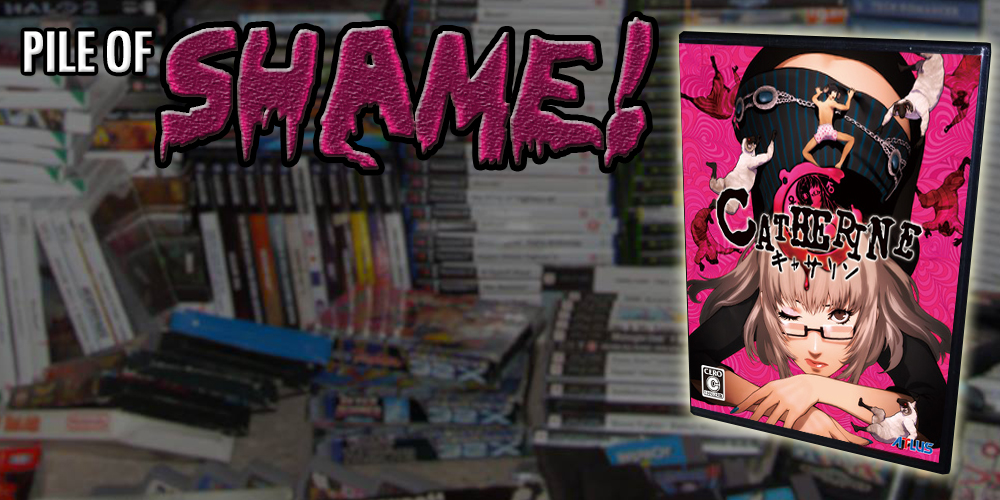
Catherine is probably one of the strangest games to describe to someone who has never heard of it before. One part romantic horror adventure and one part puzzle-platformer, it’s easily one of the most unique games you’ll ever come across both in aesthetic and how it plays. Developed by the studio behind the critically acclaimed Persona series and released first in the US in July, 2011, I went out of my way to purchase the game online ahead of a local release, but sadly never got to finish it. Something brought me back to this game recently, however. I’ve been in the mood to play something radically different to the current trends, though still AAA and with a good amount of difficulty, and this weird, hyper-sexualised (but not in a gross Dead or Alive Xtreme 3 way) puzzle adventure is exactly what I’d been looking for.
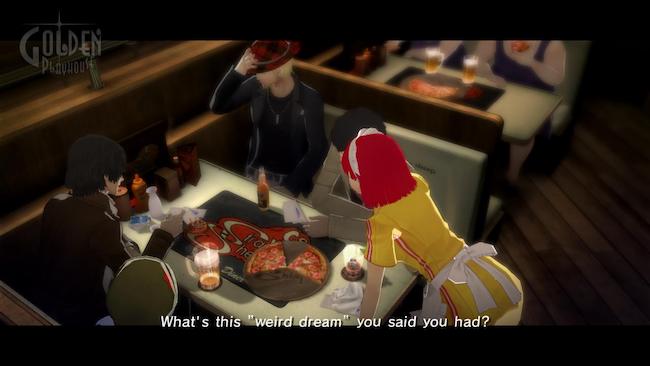
Catherine is the tale of a precarious man named Vincent Brooks who works a dead end job as a programmer and is under increasing pressure from his longtime girlfriend Katherine (with a K) to clean up his act and take their relationship more seriously. He is basically a stereotype who fears commitment, has no ambition, and isn’t going anywhere fast in life. What’s unique about the story setup in this game is that it’s delivered through a framing device called the “Golden Playhouse,” which is a fictional television program hosted by Trisha, the Midnight Venus, who converses directly with the player. There is also standalone 1-2 player arcade mode called “Babel” that is unlocked progressively as you earn gold trophies in the main story. It is brutally hard and the floors are randomised each time, so approach it with caution.
The story mode is essentially split into two main components. The first will see you controlling Vincent at his local bar where you can talk with customers, send text messages, listen to music, and play a mini-game called Rapunzel. This is also where our protagonist first encounters a mysterious girl named Catherine (with a C), who just so happens to be his type. Despite having no memory of how, he wakes up the next morning confused and horrified to see her lying in bed next to him. Not only is his life about to spiral out of control, but he starts having nightmares each night where he must climb a series of towers or plummet to his death. In the game, players experience this as puzzle-platformer that gets progressively more difficult with each floor and culminates in a boss encounter derived from his fears for that day.
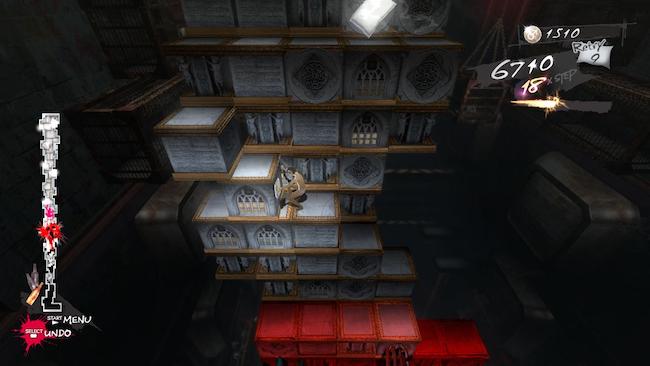
At its core, Catherine is a story about infidelity—which is a largely unexplored subject in gaming. It’s a fascinating idea, too; even if the overall execution could be interpreted as sexist. Personally, however, I would argue that the underlining plot is more of a commentary on social issues faced by Japan today than male promiscuity. It’s hard to dig deeper into what that means without spoilers, but those familiar Japanese culture might get what I mean. What’s so intriguing for me, though, is that when I first played the game, I had just gone through a bad breakup and was feeling very negative towards commitment. Playing the game today, however, not only am I married, but I also fathered a beautiful baby girl earlier this year and couldn’t be happier with my life situation. In some ways, it was like playing a totally different game.
There is no denying that the social-sim component is a bit unusual, but Atlus also happen to be one of the best in the business when it comes to writing great character stories, so it works. In addition, the puzzle sections can become so exhausting that having some time to wind down feels essential in balancing the game. Basically, the way it works is that each day begins with a cutscene that depicts Vincent’s daily activities before you take control of him at the bar at night. There are multiple endings, so who you choose to talk with and what you say matters, as do the text messages you can customise when conversing with both Katherine and Catherine. This is tracked with an on-screen meter you’ll see shift based on your dialogue choices. It’s not exactly a morality gauge, however, so it’s best to just speak honestly.
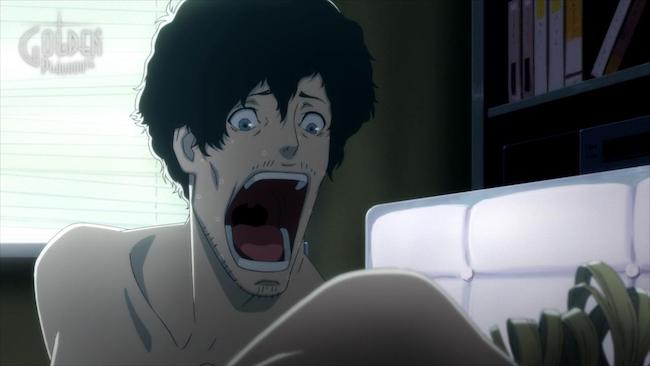
It’s important going in to understand that despite being narrative-driven, Catherine is still primarily a puzzle game and a difficult one at that. If you’re only coming for the story, expect frustration. The game requires patience and dedication if you’re to have any hope of completing it, so it’s not going to be for everyone. However, for players such as myself who thrive on games that force you to learn from mistakes to overcome a series of challenges (i.e. Dark Souls), it’s highly rewarding if you stick with it. I’d even go as far as to say Catherine is one of the best puzzle games I have ever played. Not only does it offer a fantastic sense of progression by continually adding new obstacles, it also ensures that you’re always empowered with the techniques you need to defeat it. Apart from a couple of awkward controls, it’s rock solid.
The tower climbing itself is fast-paced and enthralling, especially when you have a boss biting at your heels. It’s equal parts terrifying and exhilarating. As you progress to the higher floors, there are new blocks you must learn to deal with, such as ice, which can cause you to slide off the edge, or spikes that will instantly kill you. There are also special items you can use to your advantage, such as being able to place an extra block or remove all enemies. Between the floors, however, there is a sort of respite where you can save your game, converse and share techniques with other men who are stuck in the nightmare, or sacrifice some of your points to buy items from a merchant. Judgement is the prominent theme here, so everyone but Vincent looks like a sheep, and, before you move on, you must answer a moral question.
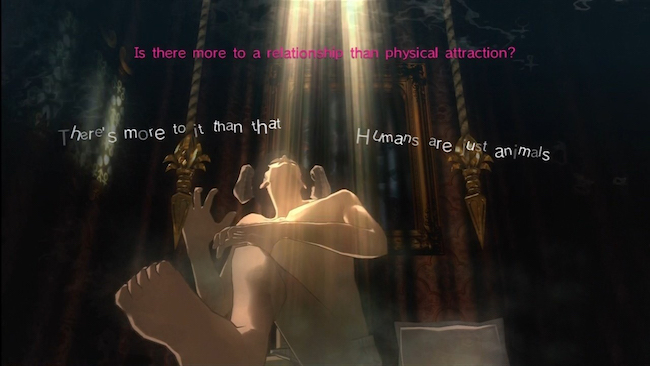
In addition to Catherine’s taboo tale of infidelity and its exhilarating puzzle-platforming, something else I think makes it stand apart from other games is its anime-esque art style. While it’s true that many games have been able to capture the anime aesthetic to varying degrees since the widespread adoption of cel-shaded graphics (thanks, Jet Set Radio!), I don’t think any have realised a darker, more mature tone as well as Catherine. The game’s bizarre blend of romance and horror is its biggest asset, which creates an identity that is completely unmistakable and works perfectly in unison with an incredible soundtrack by Shoji Meguro (best known for his work on the Persona series). Even going back five years now and playing on the PS3, it holds up extremely well and could easily be remastered for current-gen systems.
At the end of the day, though, as much as I revelled in the puzzle-platforming of Catherine, it’s the story that resonated with me most. I couldn’t imagine a character more unlike myself than Vincent Brooks, so I went in assuming I would struggle to form a connection with him. And yet, to the contrary, I found his fear and perspective toward things I have already done in my life utterly compelling, especially by comparison to the empathy I once felt toward his avoidance of commitment five years ago. It demonstrates the narrative can be enjoyed from many different angles, and I appreciate that, even if some of the choices do come across as much too black or white. I was pleased to not only see Vincent grow as a character and try to take control of his life but also deal with the consequences of his actions along the way.
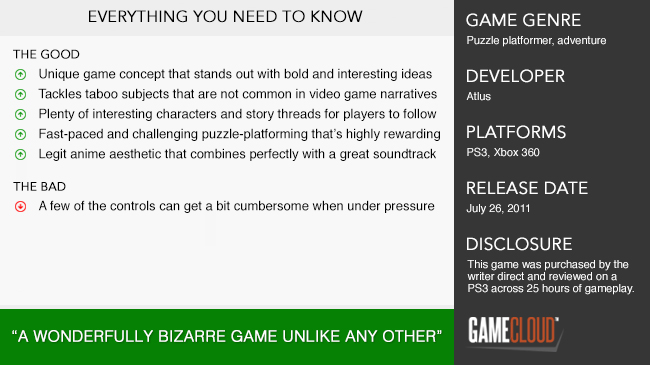
I often enjoy games which dare to think outside the box and do something different, and this is one of the few where I can legitimately say there is almost nothing else like it. I mean, a romantic horror / social-sim / puzzle-platformer that’s framed as a fictional TV program? It sounds like I just made that up. What first caught my attention about Catherine, though, is the taboo nature of its narrative—at least for video games anyway. It’s a truly unique game that succeeds in telling a compelling story that’s brimming with loads of interesting dialogue and characters, as well as delivering highly addictive gameplay that’s as brutal as it is enthralling. Catherine may just be one of the best puzzle-platformers that I have ever played. It’s got some quirks, and the sexual themes may deter some players, but trust me, it’s worth a shot!











